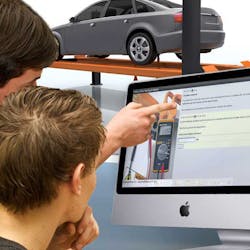A trending trainee e-learning system that plays like a three-dimensional video game is preparing potential technicians and parts personnel for real-world work. Called Electude, the technology’s attitude is geared toward meshing with the study habits of today’s students while addressing the advanced-instructional needs of experienced repairers.
“It is the core of our online training offer. We consider them a strategic partner,” reports Chris Chesney, senior director of customer training at the Carquest Technical Institute.
“They’re constantly improving their product,” says Chesney, providing timely updates to cover the latest in emerging vehicle technologies.
The interactive qualities of the educational system are especially appealing, he adds. “It’s not just read-and-take-a-test, and it’s not just watch-and-take-a-test. It’s self-discovery – totally interactive. The learner doesn’t just sit and answer questions.”
“It has a lot of the same aspects as a video game,” says Darcy Wedel, Electude’s North American sales manager. “Many students in the industry don’t like to read – they like hands-on learning. It’s not just about reading; it’s interacting with the animations. It’s active rather than passive learning.”
“This innovative solution improves retention and makes learning dynamic, effective, fast and much more fun,” says Thomas Snyder, the Netherlands-based company’s chief commercial officer. “Available in over 35 languages, we also align our solution to local standards and qualifications, and facilitate personalization to meet individual students’ interests and abilities.”
The curriculum encompasses more than 1,000 lessons and quizzes to assist existing industry professionals and students seeking to become technicians or join the distribution and retail ranks.
“Any knowledge of the internal working of an automobile is helpful for people pulling parts off shelves,” Wedel points out. “It makes you a better parts professional.”
“There are players in the aftermarket space who use this to help sell parts and train their distributors,” says Snyder. “It’s being used by auto service chains – we call them ‘fast-fitters’ – to train their personnel because they typically have a high turnover, so this is a good training tool.”
Hires result among Joe Hires’ high school students who complete their coursework at the Nichols Career Center in Jefferson City, Mo. “Two-thirds of my students go on to a technical school or the military to get additional training, and 20 percent of them go on to a car or light truck-related job,” he says. “I have successful students at every dealership in Jeff City, and they’re also working at independent shops.”
“Some aftermarket businesses use it as an assessment to hire,” says Snyder. “An online assessment is a good way to sift through those who have strong technical knowledge and those who don’t.”
Rigorous content
Previously branded as Argo, the system is particularly perceptive in reaching out to students accustomed to sophisticated interactive gaming applications.
“A lot of times gamers don’t sit down and read the rules to the game, they grab the controls and start playing,” says Wedel, stressing a multitude of exploratory options to be pursued. “It engages the learner on a much higher level. It’s truly discovery-based – they learn by doing.”
“It leaves certain parts of information out, so the students discover them on their own,” he explains. “They gather the other bits of information by interacting with the animations.”
Courses cover all levels of the industry, ranging from beginners to diagnostic experts.
Subjects include brakes, suspensions, electrical systems, heating & air conditioning, gasoline engines and other topics such as the 45 lessons on light-vehicle diesels. A heavy duty element is due to be rolled out soon. Electric vehicle and hybrid sections are already on board.
Additional lessons, known as modules, are continually being crafted and adapted, according to Wedel, presenting trainers with a wide variety of subject material based on your individual instructional needs.
“Because it’s so modular you can construct whatever you want,” he says, such as coordinating direct involvement with diagnostic, repair and installation equipment.
“A lot of schools require the students to do certain activities in the shop. We provide teachers with an electronic work order that will guide the students through their work activities,” says Wedel. “We have a tracking system to help teachers document the ASE tests.”
“There’s a lot of need out there” for this type of education, according to Hires at the Nichols Career Center, who has utilized the program since 2008. “If it was in textbooks the students wouldn’t read them. I do as much as I can to stay away from paper, and I don’t like sitting around listening to people talk, so my students get a lot of this,” he says.
The content is rigorous. “They don’t make it easy, and if the students can’t get it right they can’t advance – they want to be out in the shop, but first they have to understand what’s going on,” says Hires.
“Since my shop is not very big, some students can be hands-on with the equipment while others are learning something else” through the online instruction.
Kinesthetic instruction
The genesis of Electude was formulated in 1990 by a duo of Dutch “automotive whiz kids,” John Vlaar and Koen Berends, as they were attending college.
Upon being invited to conduct specialized automotive training for educators, Vlaar and Berends got an earful of complaints from teachers lamenting an alleged decline in quality trainees.
The pair felt differently, attributing the problem to outdated teaching methods and materials. After graduating they formed their own company with the aim of remedying these shortfalls. Hans van der Riet – who had joined Vlaar and Berends as lead technologist – saw that the future of automotive education was with e-learning. Inspired by lessons learned by researching recreational gaming applications, their first program was released in 1999.
In 2009 Thomas Snyder was added as the company’s chief commercial officer; by 2014 the automotive core curriculum was completed along with enacting a commitment to consistently add updates and new modules.
“Here at Electude, we understand that automotive students, typically visual and kinesthetic learners, do not like to read but need to understand the ‘how and why’ of today’s automotive technology,” says Snyder. (Kinesthetic is defined as “a learning style in which learning takes place by the students carrying out physical activities rather than listening to a lecture or watching demonstrations.”) “As such, our simulation-based, 3D graphic enriched and gamified e-learning lessons replace static, passive learning tools with an engaging, interactive user-experience that encourages discovery and ‘learning by doing.’”
A series of accolades have arrived as the program gains an enhanced global presence.
In 2017 Corporate Vision Magazine bestowed the firm with its Best Automotive e-Learning Company Award in the HR & Training category.
Another honor originated from a panel of judges convened at the Learning Technologies Conference in London, who gave Electude their Gold Award for Excellence in Design of Learning Content.
“Our company has set out to fundamentally change how automotive technology is taught, and we believe we are achieving that goal,” Snyder says. “Being recognized as best-in-class by a panel of independent judges affirms our company’s vision and mission.”
Subscribe to Aftermarket Business World and receive articles like this every month….absolutely free. Click here.



